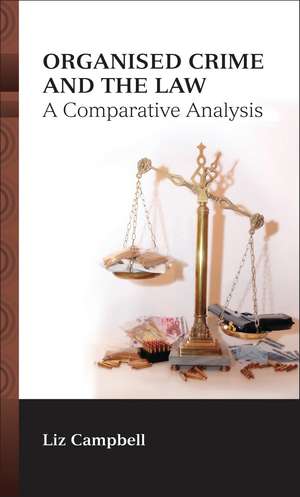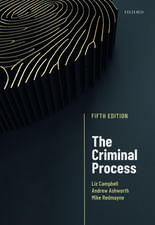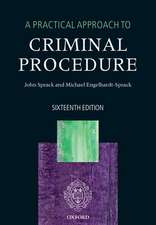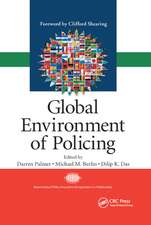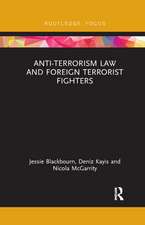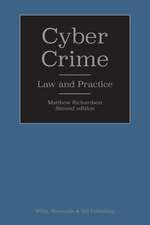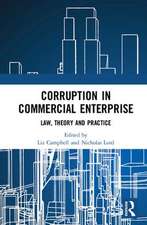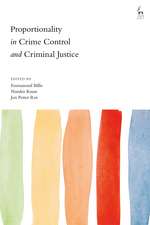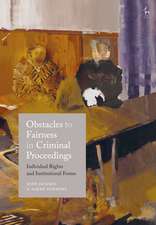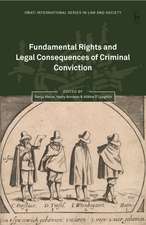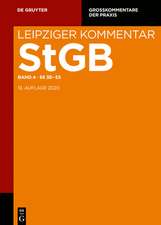Organised Crime and the Law: A Comparative Analysis
Autor Liz Campbellen Limba Engleză Paperback – 31 ian 2013
Preț: 345.60 lei
Preț vechi: 476.16 lei
-27% Nou
Puncte Express: 518
Preț estimativ în valută:
66.14€ • 68.79$ • 55.35£
66.14€ • 68.79$ • 55.35£
Carte tipărită la comandă
Livrare economică 15-29 martie
Preluare comenzi: 021 569.72.76
Specificații
ISBN-13: 9781849461221
ISBN-10: 1849461228
Pagini: 316
Dimensiuni: 156 x 234 x 12 mm
Greutate: 0.45 kg
Ediția:New.
Editura: Bloomsbury Publishing
Colecția Hart Publishing
Locul publicării:London, United Kingdom
ISBN-10: 1849461228
Pagini: 316
Dimensiuni: 156 x 234 x 12 mm
Greutate: 0.45 kg
Ediția:New.
Editura: Bloomsbury Publishing
Colecția Hart Publishing
Locul publicării:London, United Kingdom
Caracteristici
The author assesses the degree to which the justice systems in these jurisdictions have been recalibrated, in terms of the prevention, investigation, prosecution and punishment of organised criminality.The book will be essential reading for all those studying or working in the area of organised crime.
Notă biografică
Liz Campbell is Senior Lecturer at the School of Law, University of Edinburgh. This project was supported by the Fulbright Commission.
Cuprins
1 Introduction I. The Comparator Jurisdictions II. The Legal Framework III. The International Dimension IV. The Theoretical Lens V. Structural Outline 2 Organised Crime: Defining, Measuring and Criminalising the ProblemI. Introduction II. Defining Organised Crime III. The Extent of the Problem IV. Criminalising Organised Crime V. What are Organised Crimes? VI. New State Agencies VII. Conclusion3 The Theoretical Framework: Tensions in Criminal Justice I. Introduction II. Competing Demands in the Criminal Process III. The Judiciary and Due Process - Dialogue Between the Arms of the State IV. Conclusion4 Investigating Organised Crime: Altering the Pre-trial Process I. Introduction II. Access and Disclosure Orders III. Suspicious Activity ReportsIV. Surveillance V. Covert Human Intelligence Sources VI. Controlled Deliveries VII. Detention VIII. Interrogation IX. Conclusion 5 Prosecuting Organised Crime: The Criminal Trial 1I. Introduction II. Procedural Law Changes III. Threats to Jurors and Witnesses IV. Threats to Jurors V. Threats to Witnesses VI. Conclusion 6 Punishing Organised Crime: The Post-Conviction Stage of the Criminal Process I. Introduction II. General Principles of Sentencing III. Sentencing Organised Crimes IV. Reduction of Sentences in Return for Assistance V. Confiscation of Property upon Conviction VI. Further Ancillary Orders VII. Conclusion 7 Beyond the Criminal Realm: Civil Asset Recovery I. Introduction II. The Irish Prototype III. The Proceeds of Crime Acts IV. Interaction between Confiscation and Recovery Powers V. Challenges to Civil Recovery VI. Success of the Civil Process VII. Further Civil Orders VIII. Conclusion 8 Revenue Matters: Taxing Organised Crime I. Introduction II. Taxing the Profits of Illegal Acts III. Appeals against Tax Assessments IV. Challenges to Revenue Powers V. Interplay between Civil Recovery and Revenue Powers VI. Conclusion 9 Conclusion I. Introduction II. Explaining the Dominant Narrative III. Recalibrating the Criminal Justice Process IV. Key National Differences V. Concluding Remarks
Recenzii
.a well-structured and carefully argued work which addresses both the theoretical and practical implications of organised crime.
...a very well researched, diverse, and thoughtful piece of literature...This monograph gives an up-to-date account of all the relevant issues in question. It enriches the international debate and makes for worthwhile reading...
...a very well researched, diverse, and thoughtful piece of literature...This monograph gives an up-to-date account of all the relevant issues in question. It enriches the international debate and makes for worthwhile reading...
Descriere
The book examines how laws and policies adopted to address organised crime in the UK and Ireland have been recalibrated, in terms of the prevention, investigation, prosecution and punishment of organised criminality.
